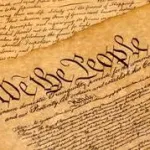The Constitution & Bill of Rights
Times Read: 5960
These founding documents are the bedrock of our Liberty and the Supreme Law of the Land. The sole purpose of government, as stated in the Declaration of Independence, is to secure our unalienable rights given us by our Creator. When Government grows beyond this scope, it is usurpation, and liberty is compromised.
 These founding documents are the bedrock of our Liberty and the Supreme Law of the Land. The sole purpose of government, as stated in the Declaration of Independence, is to secure our unalienable rights given us by our Creator. When Government grows beyond this scope, it is usurpation, and liberty is compromised. We believe the major issues we face today are best solved by a renewed allegiance to the original intent of the United States Constitution and the Bill of Rights.
These founding documents are the bedrock of our Liberty and the Supreme Law of the Land. The sole purpose of government, as stated in the Declaration of Independence, is to secure our unalienable rights given us by our Creator. When Government grows beyond this scope, it is usurpation, and liberty is compromised. We believe the major issues we face today are best solved by a renewed allegiance to the original intent of the United States Constitution and the Bill of Rights.
Thomas Jefferson – Letter to Judge William Johnson, (from Monticello, June 12, 1823)
“On every question of construction [of the Constitution] let us carry ourselves back to the time when the Constitution was adopted, recollect the spirit manifested in the debates, and instead of trying what meaning may be squeezed out of the text, or intended against it, conform to the probable one in which it was passed.”
James Madison – speech to the Virginia Ratifying Convention, (June 16, 1788)
“There are more instances of the abridgment of the freedom of the people by gradual and silent encroachments of those in power than by violent and sudden usurpations.”
The Founding Fathers were astute students of history. When constructing the Constitution, protecting their posterities’ liberties from the timeless, innate flaws of man and government was their primary objective. Man has and will always covet despotic power at all costs. Historically, government inherently and perpetually grows. As it does, individual liberties diminish.
The Preamble to the Bill of Rights is no less clear in expressing the defense of Liberty:
“THE Conventions of a number of the States having at the time of their adopting the Constitution, expressed a desire, in order to prevent misconstruction or abuse of its powers, that further declaratory and restrictive clauses should be added: And as extending the ground of public confidence in the Government, will best insure the beneficent ends of its institution.”
 These founding documents are the bedrock of our Liberty and the Supreme Law of the Land. The sole purpose of government, as stated in the Declaration of Independence, is to secure our unalienable rights given us by our Creator. When Government grows beyond this scope, it is usurpation, and liberty is compromised. We believe the major issues we face today are best solved by a renewed allegiance to the original intent of the United States Constitution and the Bill of Rights.
These founding documents are the bedrock of our Liberty and the Supreme Law of the Land. The sole purpose of government, as stated in the Declaration of Independence, is to secure our unalienable rights given us by our Creator. When Government grows beyond this scope, it is usurpation, and liberty is compromised. We believe the major issues we face today are best solved by a renewed allegiance to the original intent of the United States Constitution and the Bill of Rights.Thomas Jefferson – Letter to Judge William Johnson, (from Monticello, June 12, 1823)
“On every question of construction [of the Constitution] let us carry ourselves back to the time when the Constitution was adopted, recollect the spirit manifested in the debates, and instead of trying what meaning may be squeezed out of the text, or intended against it, conform to the probable one in which it was passed.”
James Madison – speech to the Virginia Ratifying Convention, (June 16, 1788)
“There are more instances of the abridgment of the freedom of the people by gradual and silent encroachments of those in power than by violent and sudden usurpations.”
The Founding Fathers were astute students of history. When constructing the Constitution, protecting their posterities’ liberties from the timeless, innate flaws of man and government was their primary objective. Man has and will always covet despotic power at all costs. Historically, government inherently and perpetually grows. As it does, individual liberties diminish.
The Preamble to the Bill of Rights is no less clear in expressing the defense of Liberty:
“THE Conventions of a number of the States having at the time of their adopting the Constitution, expressed a desire, in order to prevent misconstruction or abuse of its powers, that further declaratory and restrictive clauses should be added: And as extending the ground of public confidence in the Government, will best insure the beneficent ends of its institution.”




